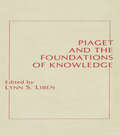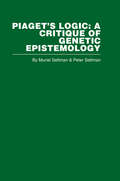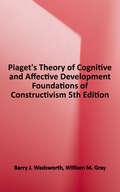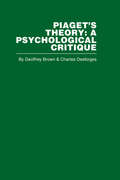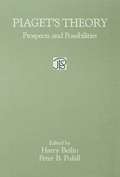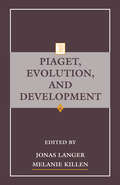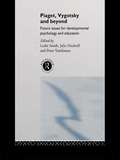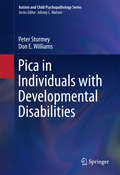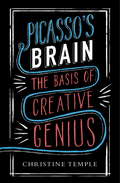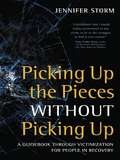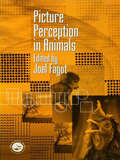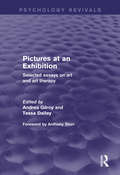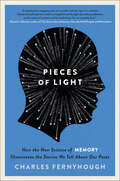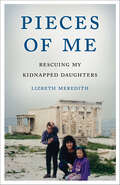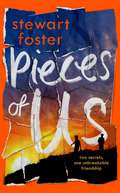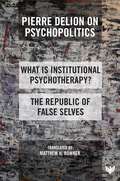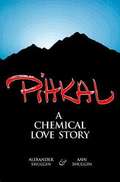- Table View
- List View
Piaget and Vygotsky in XXI century: Discourse in early childhood education (Early Childhood Research and Education: An Inter-theoretical Focus #4)
by Ingrid Pramling Samuelsson Nikolay VeraksaThe book provides a comprehensive analyses of Vygotsky’s and Piaget’s theories implementation in modern preschool education. It analyzes the problem of the relationship between the natural and the cultural in the context of Vygotsky and Jean Piaget theories. Their discourses complemented each other: whereas Vygotsky developed his theory in the direction from society (culture) to the individual child, Piaget’s movement was the opposite: from individual child to society. These two approaches confront modern world with the need to analyze the problem of childhood: is childhood a period of cultural exploration or is it a special form of relationship in which both the egocentrism and consciousness of the child, and the egocentrism and consciousness of culture are represented?Readers will gain insight into the methodology that makes possible to unite up-to-date views based on Vygotsky and Piaget theories on child development and education.
Piaget and the Foundations of Knowledge (Jean Piaget Symposia Series)
by Lynn S. LibenFirst published in 1983. Routledge is an imprint of Taylor & Francis, an informa company.
Piaget's Logic: A Critique Of Genetic Epistemology
by Muriel SeltmanThis book was first published in 1985.
Piaget's Theory of Cognitive and Affective Development: Foundations of Constructivism, 5th Edition
by Barry J. WadsworthThis best-selling introduction to Jean Piaget's theory shows readers how children construct and acquire knowledge of current constructivist approaches. This text is well-regarded as a work that preserves the historically important research done by Jean Piaget. The Classics Edition retains all of the content of the previous edition and contains updates in critical areas by Barry Wadsworth and a foreword by William Gray, Dean of the School of Education, University of Toledo.
Piaget's Theory: A Psychological Critique
by G. Brown C. DesforgesThis book was first published in 1979.
Piaget's Theory: Prospects and Possibilities (Jean Piaget Symposia Series)
by Harry Beilin Peter PufallThis volume marks the 20th Anniversary Symposium of the Jean Piaget Society. Some of the American contributors were among the first to introduce Piaget to developmental and educational psychology in the United States, while some of the international contributors worked with Piaget to develop his program of genetic epistemology and continue to make significant contributions to it. Within this volume the possibility of Piaget's paradigm is reviewed not only as the stuff of normal science, yielding fascinating empirical questions that linger within it, but also, and more importantly, as the stuff of revolutionary science, with continuing potential to comprehensively structure our thinking about developmental theory. The constructive contribution Piaget's theory has for developmental theory emerges as four central themes in the volume: understanding the intentional or semantic aspect of mental life without abandoning the Piagetian assumption that is rational and committed to truth testing; examining mental life and its development as a dialectical relation of function and structure--a relation Piaget introduced in his study of the developmental relation between procedural and operational knowledge; exploring new and interdisciplinary perspectives on equilibration as the driving force of constructive adaptive processes; understanding social and historical forces in individual and cultural development--not necessarily as forces antithetical to Piaget's perspective but as forces that take on new meaning within his framework which avoids erroneous dichotomies such as the distinction between subjective and objective knowledge.
Piaget, Evolution, and Development (Jean Piaget Symposia Series)
by Melanie Killen Jonas LangerBased on the 25th Anniversary Symposium of the Jean Piaget Society, this book represents cutting-edge work on the mechanisms of cognitive, social, and cultural development. The authors-anthropologists, biologists, historians of science, paleontologists, and psychologists-believe that a rebirth is in progress relating to the study of these mental developments. This volume seeks to illuminate this rebirth. The varied findings and approaches reported reveal that contemporary comparative research on mental development is in a phase of differentiation and integration. Far from being global and fused, this comparative study is a flowering field of diverse disciplinary approaches, empirical phenomena, scholarly topics, and theoretical perspectives. It focuses on the comparative phylogeny, ontogeny, and history of mentation-most notably on the comparative onset and offset ages, velocity, extent, sequencing, organization of thought, symbol, and value development. The world's leading authorities on the subject discuss the implications of the study of evolution for our models of the ontogenetic origins, development, and history of mentation, as well as determine the constraints that evolution imposes on mental development. Bringing the current interest in primate cognition to bear on studies of cognitive development in humans, this book will be of interest cognitive developmentalists, primatologists and comparitive psychologists.
Piaget, Vygotsky & Beyond: Central Issues in Developmental Psychology and Education
by Leslie Smith Julie Dockrell Peter TomlinsonThis collection of original contributions by leading researchers celebrates the 1996 centenary of the births of the two most seminal figures in education and developmental psychology - Jean Piaget and Lev Vygotsky. Research in their footsteps continues worldwide and is growing.What are the implications for the future for this extensive programme? Which of the large body of findings has proved most important to current research? Based around five themes, these original contributions cover educational intervention and teaching, social collaboration and learning, cognitive skills and domains, the measurement of development and the development of modal understanding.
Piagetian Reasoning and the Blind
by Yvette HatwellThe book reports the results of a series of studies undertaken in the early 1960s on the cognitive development of children with congenital blindness.
Pica in Individuals with Developmental Disabilities
by Peter Sturmey Don E. WilliamsThis book provides a comprehensive overview of the clinical phenomenon of pica. It focuses specifically on the disorder as it presents in children, adolescents, and adults with autism spectrum disorder (ASD) and intellectual disabilities (ID). Initial chapters introduce current theories and definitions, followed by a more detailed examination of how developmental disabilities complicate diagnosis and intervention. The volume describes evidence-based and clinically sound approaches to the treatment and prevention of pica in school and adult clinical settings, ranging from behavioral treatment to function-based interventions. In addition, it discusses common diagnostic, client, and provider issues that result in pica remaining undetected among individuals with ASD and ID. Featured topics include: Definition of pica in accessible terms, differentiating between various forms of the disorder. Issues and practical methods of prevention and treatment of pica in developmentally disabled persons. Functional and behavioral assessment methods for pica in individuals with ASD and ID. A range of effective behavioral and nonbehavioral treatments for pica. Illustrative cases and service delivery challenges. Areas for future research and practice. Pica in Individuals with Developmental Disabilities is an invaluable resource for researchers, clinicians and other professionals, and graduate students in clinical child and school psychology, behavior analysis/therapy, and social work as well as child and adolescent psychiatry, pediatrics, family studies, and special education.
Picasso's Brain: The basis of creative genius
by Christine TempleWhere does creativity come from? Why are some people more creative than others?Eminent neuropsychologist Christine Temple navigates a wide range of factors from the hard science (visual memory, spatial ability, brain functions) to the environmental (the 'mad genius' myth, and Gladwell's 10,000 hours of practice) in her study of what contributes to creativity. Using Pablo Picasso as her model of a creative genius, she weighs up each theory as it applies to Picasso and shows how his own creativity came from a combination of many factors.In this book, she looks at Picasso's playful mindset and passionate relationships, investigates the possibility that genius is genetic and can be inherited in families, considers whether creative genii perceive the world in a different way, and determines whether single-mindedness and focus play a part. This is the first book to look at a multitude of traits in creativity, and nail down the key factors that matter (and also which ones don't) to provide an overall picture of this fascinating area, linking the science to the personal.
Picasso's Brain: The basis of creative genius
by Christine TempleWhere does creativity come from? Why are some people more creative than others?Eminent neuropsychologist Christine Temple navigates a wide range of factors from the hard science (visual memory, spatial ability, brain functions) to the environmental (the 'mad genius' myth, and Gladwell's 10,000 hours of practice) in her study of what contributes to creativity. Using Pablo Picasso as her model of a creative genius, she weighs up each theory as it applies to Picasso and shows how his own creativity came from a combination of many factors.In this book, she looks at Picasso's playful mindset and passionate relationships, investigates the possibility that genius is genetic and can be inherited in families, considers whether creative genii perceive the world in a different way, and determines whether single-mindedness and focus play a part. This is the first book to look at a multitude of traits in creativity, and nail down the key factors that matter (and also which ones don't) to provide an overall picture of this fascinating area, linking the science to the personal.
Picking Up the Pieces without Picking Up
by Jennifer StormAn empowering, compassionate guidebook that will assist those in recovery who have been victimized by crime or a traumatic event in healing and rebuilding their lives without returning to addictive behaviors.
Picnic Comma Lightning: The Experience Of Reality In The Twenty-first Century
by Laurence ScottIn Vladimir Nabokov’s Lolita, Humbert Humbert offers a memorably brief account of his parents’ death: “picnic, lightning.” <P><P>Picnic Comma Lightning, too, opens with death—that of Laurence Scott’s mother—because, for a philosopher, death raises a profound existential question: How do we know what is real, especially when we have come to question the reality of so many of our day-to-day experiences? <P><P>Writing from the intersection of philosophy, politics, and memoir, Scott transforms his personal meditation on loss into a beguiling exploration of what it means to exist in the world today. <P><P>It used to be that our lives were rooted in reasonably solid things: to people, places and memories. Now, in an age of online personas, alternative truths, constant surveillance and an increasingly hysterical news cycle, our realities are becoming flimsier and more vulnerable than ever before. <P><P>Scott’s far-ranging examination charts the ways our traditional mental models of the world have started to fray. He ponders how ubiquitous cameras reframe our private lives (an event only exists once someone posts the video), how mysterious algorithms undermine our attempts at self-definition through their own data-driven portraits, and what happens in those moments when our illusions about reality are ruptured by incontrovertible facts (like the death of a parent or a bolt of lightning). <P><P>“A report from the front line of the online generation” (Sunday Times), Picnic Comma Lightning is an essential account of how we’ve started to make sense of our strange new world.
Picture Perception in Animals
by Joël FagotAnimal researchers commonly present pictures to their subjects, usually birds or monkeys, in order to infer how natural objects are perceived and conceptualised, or to discover the brain mechanisms underlying these abilities. This unique book questions the premise of this experimental approach and asks whether or not pictures can be considered as ecologically valid and realistic stimuli for animals.Leading researchers in comparative psychology and neuroscience address such questions as: "Can animals recognise objects of scenes in pictures despite variations in viewpoints?; "How do animals perceive faces?" and "Is there an equivalence, in animals' minds, between pictures and the objects they represent?". The result is an authoritative and cutting-edge survey of current knowledge in the field, which underlines the advantages, limits and risks of using pictures to infer cognitive abilities or brain mechanisms in animal studies.Picture Perception in Animals will be essential reading for comparative psychologists, anthropologists, and neuroscientists working in picture perception.
Pictures at an Exhibition: Selected Essays on Art and Art Therapy (Psychology Revivals)
by Tessa Dalley Andrea GilroyOriginally published in 1989 Pictures at an Exhibition brings together a rich collection of essays, representing the diversity of views and approaches among professionals towards art and psychoanalysis and art therapy. The editors, both of whom are practising art therapists and art therapy educators, have arranged the contributions so that they may be read in a way similar to looking at pictures in a gallery: they can be glanced at briefly or lingered over, read consecutively or dipped into at random. Artists, art therapists, psychotherapists, psychiatrists and art historians will all find something of interest, and something to stimulate thought and discussion. Contributions include innovative papers on the relationship between artists’ lives and the subject-matter of their work; the work of Kandinsky, Picasso, Magritte, Moore, Lear and Genet is looked at in particular. Generously illustrated, the book also highlights the importance of language and culture in attempting to understand imagery. Each contribution is linked by editorial comments drawing together the threads of concern which are common to art and psychiatry.
Pieces of Light: How the New Science of Memory Illuminates the Stories We Tell About Our Pasts
by Charles FernyhoughIn a blend of memoir and science, a psychologist presents a “thoughtful exploration” of autobiographical memory (Booklist).A new consensus is emerging among cognitive scientists: rather than possessing fixed, unchanging memories, we create new recollections each time we are called upon to remember. As psychologist Charles Fernyhough explains, remembering is an act of narrative imagination as much as it is the product of a neurological process. In Pieces of Light, he illuminates this compelling scientific breakthrough in a series of personal stories, each illustrating memory’s complex synergy of cognitive and neurological functions.Combining science and literature, the ordinary and the extraordinary, this fascinating tour through the new science of autobiographical memory helps us better understand the ways we remember—and the ways we forget. Book of the Year: Sunday Times, Sunday Express, and New Scientist
Pieces of Me: Rescuing My Kidnapped Daughters
by Lizbeth MeredithNow a Lifetime television movie starring Sarah Drew, Stolen By Their Father was adapted from the story of Pieces of Me: Rescuing My Kidnapped Daughters about a young mother and her daughters face the unimaginable consequences after leaving abuse. In 1994, Lizbeth Meredith said good-bye to her four- and six year-old daughters for a visit with their non-custodial father only to learn days later that they had been kidnapped and taken to their father's home country of Greece. Twenty-nine and just on the verge of making her dreams of financial independence for her and her daughters come true, Lizbeth now faced a $100,000 problem on a $10 an hour budget. For the next two years fueled by memories of her own childhood kidnapping, Lizbeth traded in her small life for a life more public, traveling to the White House and Greece, and becoming a local media sensation in order to garner interest in her efforts. The generous community of Anchorage becomes Lizbeth's makeshift family?one that is replicated by a growing number of Greeks and expats overseas who help Lizbeth navigate the turbulent path leading back to her daughters.
Pieces of Us
by Stewart FosterTwo secrets, an unbreakable bond . . . a powerful and heartbreaking love letter to a life-changing friendship, from award-winning author, Stewart Foster. I wish you were here, because maybe this isn&’t a story, or a diary. Perhaps it&’s just the longest thank you letter a friend could ever write. As the summer before college begins, Jonas is hiding a secret. He suffers with bulimia, but no one knows. Not even he knows how bad it really is. Until he meets Louis, a confident dreamer who believes in a better future for Jonas and together they enjoy a sun-kissed summer filled with music, memories and life-changing moments. But when tragedy strikes, Jonas must decide if he has the strength to face things alone . . . Writing from personal experience, an award-winning author shines an important light on difficult themes of illness, mental health, and grief in a redemptive story of friendship, for readers of Meg Rosoff and Sarah Crossan. Warning: contains some themes that readers may find upsetting, including disordered eating.
Pierre Delion on Psychopolitics: 'What is Institutional Psychotherapy?' and 'The Republic of False Selves'
by Pierre DelionPierre Delion is Professor Emeritus in the faculty of medicine at Lille, a child psychiatrist, and a psychoanalyst. His work is as straightforward as it is affecting but is little read in the English-speaking world due to a lack of translation into English. Matthew Bowker, in his excellent translation, rectifies this unfortunate deficit to introduce English-language readers to the affecting and wide-ranging work of Pierre Delion through two of his best-known essays. What is Institutional Psychotherapy? examines the psychiatric establishment and institution, arguing that for institutional psychotherapy to be effective, we must "care for the institution" just as we must attend to the "transferential constellation" of the patient, the latter of which emerges only when the institution respects all the voices (including the patient's) involved in the patient's care. And, as Delion duly notes: "What holds for person-to-person psychiatry also holds true for democracy." The Republic of False Selves maintains that our social bonds have been damaged or destroyed to the extent that the practice and meaning of democracy itself are now in question. Democracy, for Delion, "refers not only to forms of government, but also to a society based on freedom and equality, or more generally still, to a set of values: political, social, or cultural ideals and principles." The democratic project, then, is threatened by contemporary political events, media images, neoliberal and techno-bureaucratic interventions, and even or especially the treatment of the mentally ill. The combination of these two works into a single text invites readers to consider the broader political connections between the clinical institution and society as a whole. Delion's careful thoughtfulness paired with his vast experience and understanding opens up new avenues of discovery to the reader.
Pierre Legendre Lessons III God in the Mirror: A Study of the Institution of Images (Discourses Of Law Ser.)
by Pierre LegendreIn the context of our increasingly global legal order, Pierre Legendre’s God in the Mirror reconsiders the place of law within the division of existing bodies of knowledge. Navigating the texts of Ovid, Augustine, Roman jurists, medieval canon lawyers, Freud, Lacan, the notebooks of Leonardo de Vinci, and the paintings of Magritte, this third volume of Pierre Legendre’s Lessons focuses on the relation of the subject to the institution of images. Legendre tracks the origins and vicissitudes of the specular metaphor within western history, carrying out a critique of its dependence on the discourse of the Imago Dei. A crucial landmark within Legendre’s ongoing reconsideration of a medieval ‘revolution of interpretation’, this book dissociates the western normative tradition from its mythic foundation, separating theology and law. It thereby documents the advent of modern rational doubt, as a new legal foundation or ground: one that, for Legendre, was not only a revolutionary invention, but one that produced the modern European idea of the State.
Pigs Eat Wolves: Going into Partnership with Your Dark Side
by Charles BatesPigs Eat Wolves challenges us to accept, as part of our being, those characteristics which we would like to see only in others. We embody the naive and wishful thinking, the dutiful and plodding sense of responsibility taking, the cautious and fearful wondering, and the outrageous and unpredictably violent side of life. To see and accept within ourselves the full range of our humanity is all that is asked by this enlightening, entertaining, shocking, and delightful recasting of this classic tale.
Pihkal: A Chemical Love Story
by David E. Nichols Alexander Shulgin Ann ShulginThis book contains two parts. The first part is a personal story of exploration by the renowned chemist Alexander Shulgan. The second part is even more interesting - it is a summery of years and years of psychadelic research on phenthalamines. Each chemical contains information on it's synthesis, dosage, effects, and commentary. Shulgan explored the known phenthalamines, then produced HUNDREDS of completely new chemicals and analogs in his quest to explore a class of chemicals that ranges from mescaline to MDMA (ecstacy).
Pijn zonder strijd
by Jaap SpaansZelfhulpboek gebaseerd op de methode van Acceptance and Commitment Therapy (ACT), toegepast op chronische pijn. Doel van het boek is de lezer te leren de pijn te aanvaarden en ermee om te gaan. Aanvaarden van chronische pijn houdt in dat je bereid bent pijn en alle gedachten en gevoelens die je daarbij hebt, waar te nemen, en er niet meer tegen te vechten. Dat verbetert de kwaliteit van leven, ook al is de pijn nog steeds aanwezig.


